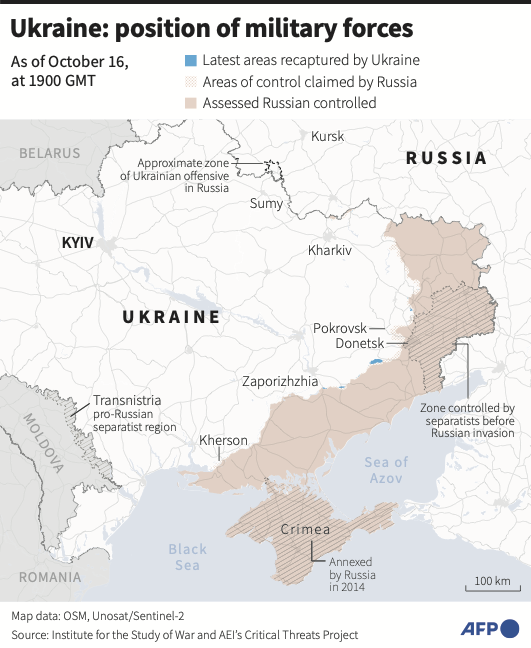BRUSSELS, Belgium: President Volodymyr Zelensky told allies Thursday that Ukraine must be in a position of strength before any peace talks with Russia, as he sought EU and NATO support for his “victory plan.”
More than two and a half years into the war, Kyiv has steadily lost territory in its eastern Donbas region and is under mounting pressure to forge a strategy — which it says must start with ramped-up Western support.
“Ukraine is ready for real diplomacy, but for it, we must be strong,” Zelensky said as he met with the EU’s 27 leaders. “We must create the right conditions to end this war.”
“If our partners will not lose their unity, we will not lose,” he said later in a joint address with NATO chief Mark Rutte.
The Ukrainian leader has traveled to Washington, Paris, Berlin, Rome and London to promote his initiative, but has yet to gain backing on the specifics of the plan — whose central plea for an immediate invitation to join NATO is widely viewed as unrealistic.
Zelensky’s blueprint also rejects any territorial concessions, calls for allies to lift restrictions on using donated long-range weapons against Russian military sites and suggests deploying a “non-nuclear strategic deterrence package” on Ukrainian territory.
Addressing reporters after the summit, European Council president Charles Michel said Zelensky’s “plan makes it clear what material and finance is needed, and rapidly.”
“We are serious in our intent to reinforce Ukraine, because reinforcing Ukraine is reinforcing ourselves,” he said.
The EU recently approved loaning Ukraine up to 35 billion euros ($38 billion) backed by frozen Russian assets — part of a bigger $50 billion initiative agreed by G7 powers in June.
Dissenting voice
But while the EU leaders’ summit conclusions reiterated their “unwavering commitment” to support Ukraine militarily and economically for “as long as it takes” — there was no explicit mention of Zelensky’s proposal.
There were dissenting voices too.
Hungary’s Moscow-friendly Prime Minister Viktor Orban posted on Facebook that Zelensky’s roadmap was “beyond terrifying,” urging France and Germany “on behalf of the entire European Union, to start negotiations with the Russians as soon as possible.”
German Chancellor Olaf Scholz had called ahead of the talks to “do everything” to end the war — potentially including talks with Russian President Vladimir Putin.

At NATO, Zelensky joined the first of two days of talks between defense ministers of the 32 member states — which have declared Ukraine to be on an “irreversible path” to membership, without giving a timeline.
The secretary-general stuck to the NATO message, saying: “I look forward to the day that Ukraine is here as a member of this alliance, and until then, we will continue to do all that we can to assure Ukraine prevails.”
The United States and Germany have led opposition to immediate entry, believing it would effectively put the alliance at war with nuclear-armed Russia.
READ MORE: A glance at Ukraine’s plan aimed at nudging Russia into talks to end the war
Although Rutte did not directly address Zelensky’s proposal, some allies gave it a warm welcome.
“We want this plan to succeed,” said British Defense Secretary John Healey. “We will work with Ukraine and encourage others to work with Ukraine in order that they do.”
Russia warning
The Kremlin meanwhile repeated its warning that Ukraine’s plan amounted to an attempt to “directly involve NATO in the conflict,” warning of “heavy consequences.”
Ukraine’s allies are aware that time is of the essence, with fears that a Donald Trump victory in the November 5 US election could upend the support Ukraine receives from NATO’s biggest power.
Driving home his appeal to Western leaders, Zelensky claimed to have intelligence that North Korea was training 10,000 soldiers to deploy with Russian forces against Ukraine — calling it “the first step to a world war.”
Rutte cautioned however that NATO has “no evidence that North Korean soldiers are involved in the fight,” although Pyongyang was known to be fueling Moscow’s war effort in other ways.
On the specifics of military support, the secretary-general said NATO was “well on track” to meet its July pledge to provide a minimum of 40 billion euros ($43 billion) in aid in 2024.
But despite Ukraine’s plea for stepped-up air defense systems — as Russian forces pound its cities and infrastructure — no new announcements were expected from NATO this week.
























